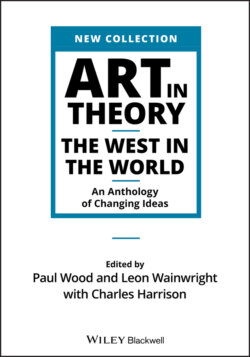Читать книгу Art in Theory - Группа авторов - Страница 146
IIC11 Samuel Johnson (1709–84) On the state of nature
ОглавлениеSamuel Johnson was at the centre of literary London in the late eighteenth century, the presiding figure of The Club, which numbered among its members Goldsmith, Reynolds, Garrick and many others. A lifelong Tory, he was also possessed of a sort of curmudgeonly humanism that saw him a convinced supporter of the pivotal Mansfield ruling of 1772. This was actually a relatively limited judgement, preventing the forced return of erstwhile slaves from England to the Caribbean, but was widely taken to amount to a proclamation of emancipation for black people in England. His own black manservant, the freed slave Francis Barber, became a friend in later life and was awarded a portion of Johnson’s estate and an annuity on his death, an amount sufficient to cause a scandal in contemporary London. Johnson had a long interest in the world beyond Europe. His first literary work in 1735 had been a translation of the Portuguese Jesuit Jerónimo Lobo’s account of his mission to Abyssinia, and in 1759 Johnson himself had written a successful Orientalist novel for the money (Rasselas, Prince of Abyssinia). His correspondence with Warren Hastings shows an interest in India, and he wrote a short introduction to William Chambers’ book on Chinese architecture. Nonetheless, his overriding commitment was always to the classical literary tradition and to the superiority of modern ‘polite’ civilization as he experienced it in England, over all others. James Boswell’s meticulous record of Johnson’s conversation is studded with observations, most of them disparaging, on voyages to the Pacific, on America, and on attempts to read virtue into the ‘state of nature’. This comes out most clearly in his rejection of contemporary literary sympathies for the ‘nobility’ of the savage life, and his fierce criticism of Rousseau and Voltaire. The present short extracts are taken from James Boswell, The Life of Samuel Johnson LL. D., in three volumes with a preface by Clement K. Shorter, verbatim reprint of the 1791 edition, privately printed for The Navarre Society, London 1924, vol. 1 pp. 341–2 and 384, vol. 3, pp. 374–5.
[1766] Our next meeting at the Mitre was on Saturday the 15th of February … I having mentioned that I had passed some time with Rousseau in his wild retreat, and having quoted some remark made by Mr Wilkes, with whom I had spent many pleasant hours in Italy, Johnson said, sarcastically: ‘It seems, sir, you have kept very good company abroad, Rousseau and Wilkes!’ Thinking it enough to defend one at a time, I said nothing as to my gay friend, but answered with a smile: ‘My dear sir, you don’t call Rousseau bad company. Do you really think him a bad man?’ JOHNSON : Sir, if you are talking jestingly of this, I don’t talk with you. If you mean to be serious, I think him one of the worst of men; a rascal, who ought to be hunted out of society, as he has been. Three or four nations have expelled him; and it is a shame that he is protected in this country. […] Rousseau, sir, is a very bad man. I would sooner sign a sentence for his transportation, than that of any felon who has gone from the Old Bailey these many years. Yes, I should like to have him work in the plantations. BOSWELL : Sir, do you think him as bad a man as Voltaire? JOHNSON: Why, sir, it is difficult to settle the proportion of iniquity between them. […]
On the 30th of September [1769] we dined together at the Mitre. I attempted to argue for the superior happiness of the savage life, upon the usual fanciful topics. JOHNSON: Sir, there can be nothing more false. The savages have no bodily advantages beyond those of civilised men. They have not better health; and as to care or mental uneasiness, they are not above it, but below it, like bears. No, sir; you are not to talk such paradox: let me have no more of’t. It cannot entertain, far less can it instruct. Lord Monboddo, one of your Scotch judges, talked a great deal of such nonsense. I suffered him; but I will not suffer you. BOSWELL: But, sir, does not Rousseau talk such nonsense? JOHNSON: True, sir; but Rousseau knows he is talking nonsense, and laughs at the world for staring at him. […]
In the morning of Tuesday, 15th June [1784], while we sat at Dr Adams’s, we talked of a printed letter from the Reverend Herbert Croft, to a young gentleman who had been his pupil, in which he advised him to read to the end of whatever books he should begin to read. JOHNSON: This is surely a strange advice; you may as well resolve that whatever men you happen to get acquainted with, you are to keep to them for life. A book may be good for nothing; or there may be only one thing in it worth knowing; are we to read it all through? These Voyages (pointing to the three large volumes of Voyages to the South Sea, which were just come out), who will read them through? A man had better work his way before the mast, than read them through; they will be eaten by rats and mice before they are read through. There can be little entertainment in such books; one set of savages is like another. BOSWELL: I do not think the people of Otaheite can be reckoned savages. JOHNSON: Don’t cant in defence of savages. BOSWELL: They have the art of navigation. JOHNSON: A dog or a cat can swim. BOSWELL: They carve very ingeniously. JOHNSON: A cat can scratch, and a child with a nail can scratch.
